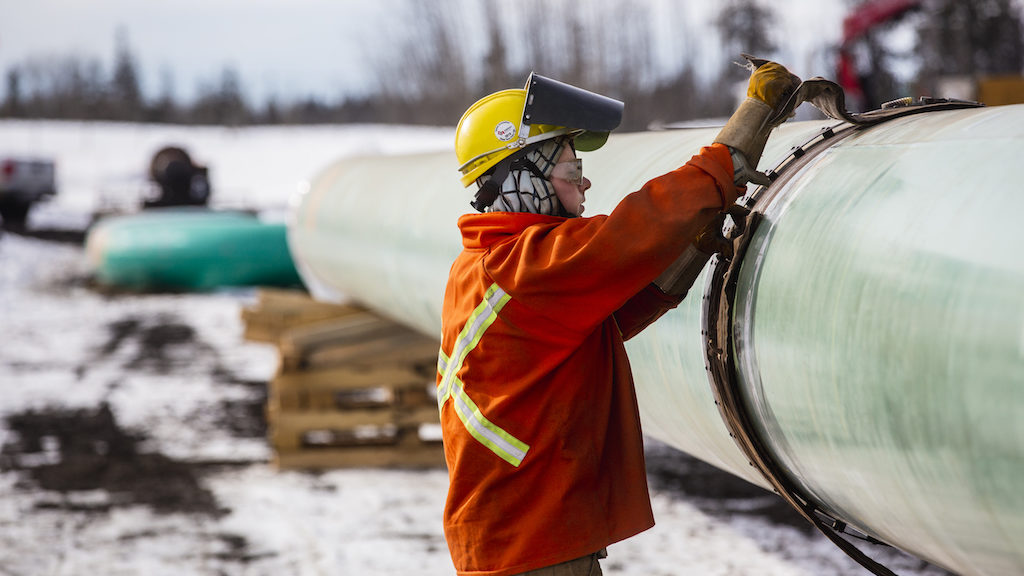
Despite growing global demand, anti-oil and gas groups are intensifying their campaign against Canadian pipeline projects now that US president Joe Biden has canceled the border crossing permit for Keystone XL.
“The uncertainty level has just dramatically increased,” says Phil Skolnick, New York-based analyst with Eight Capital.
“I feel like all oil and gas midstream projects are at risk; ones that haven’t been built yet, ones that were recently brought online, and then ones like Line 5 that are very old.”
Actions against domestic oil and gas production in North America equate to “import more oil” policies that run counter to environmental goals, according to the American Petroleum Institute.
That has risky implications for the environmental, social and governance (ESG) standards associated with oil and gas development as it continues to be required for decades to come, says Jared Dziuba, analyst with BMO Capital Markets specializing in ESG issues.
“As society, we’re not only ultra-focused right now on green initiatives but also actively chasing away investment in oil development, particularly in those regions that have the best ESG [environmental, social and governance] track record,” he says.
“It sets a dangerous precedent because ultimately these barrels of ESG-friendly oil will end up in the hands of oil jurisdictions that have much lower environmental and social standards, simply because they’re not put under the microscope.”
Growing global demand
Activists are targeting Canadian projects including the tidewater gateway Trans Mountain Pipeline Expansion, the Line 3 Replacement Project that will boost safety and increase reliable supply to the US Midwest, and Line 5, which has operated for more than 65 years without a single spill, fueling communities in Ontario, Quebec, Michigan and Ohio.
A joint statement from environmental groups argues that the world has become “a markedly different place” since TMX in particular was first proposed.
The world has indeed changed. Notably, there has been a significant increase in how much oil and gas is required to run our daily lives. Growth is expected to continue despite the increasing importance of renewable energy sources.
Meanwhile, there has been a whittling down of Canadian oil and gas pipeline projects that has eroded investor confidence, reduced potential oil and gas supply and hurt the Canadian economy.
A recent report by IHS Markit found that heavy oil producers in western Canada could have earned at least US$14 billion more over the last half-decade if there had been enough pipeline capacity – money that could have been reinvested into the sector and contributed to government tax revenues and royalties to fund social programs.
Growing oil and gas demand
Between 2010 and 2019, global oil demand jumped by 12 per cent, to 97.9 million barrels per day from 87.4 million barrels per day, according to the most recent data from the International Energy Agency. At the same time, natural gas demand increased by about 11 per cent, to 389 billion cubic feet per day from 323 billion cubic feet per day.
Demand is expected to continue increasing even as more renewable energy sources enter the global mix. The IEA forecasts that, driven by emerging economies in India and China, by 2040 natural gas demand will increase to 505 billion cubic feet per day, while oil demand grows to 104.1 million barrels per day.
More oil from OPEC
OPEC countries will produce more and more of the world’s oil while supply from non-OPEC jurisdictions declines, according to the most recent IEA forecast. The Middle East is the only jurisdiction that the agency expects to continue production growth over the next 20 years.
“There is no shortage of resources, but there is a distinct possibility that the supply side may be losing appetite for oil faster than the world’s consumers,” the IEA said.
Canada’s opportunity
Analysts say the Trans Mountain Expansion project is particularly important as it expands access to Canadian crude to customers beyond the United States.
The demand is there. The existing Trans Mountain system has been operating at full capacity – with shippers booking more space than is available – on a regular basis for the last decade. The expansion project has binding 15-to-20-year commercial agreements in place with shippers that remain committed to utilizing the space.
“TMX is extremely important in that it’s a closer way to get to Asia, which is where the demand is growing,” Skolnick says.
The benefits will flow to Canadians, with federal and provincial governments receiving revenues that can be used for public services such as health care, education and infrastructure.
The most recent available assessment by the Conference Board of Canada found that a combined $46.7 billion in royalties and taxes will be paid over construction and the first 20 years of operations of the expanded pipeline. This includes $19.4 billion in Alberta, $5.7 billion in British Columbia and $21.6 billion shared by the rest of Canada.